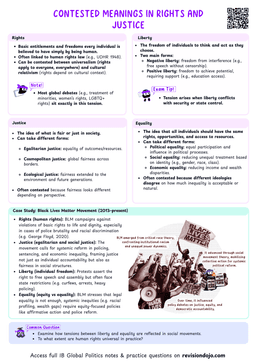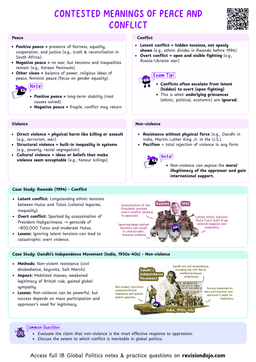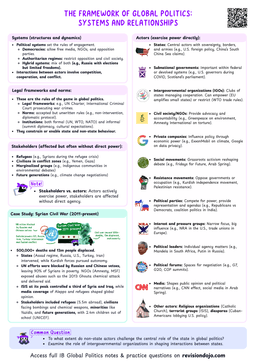Understanding Rights: A Foundational Concept
Rights
Rights are fundamental entitlements or freedoms that individuals possess, often considered essential for dignity, equality, and justice.
- Legal Rights: Enshrined in laws and constitutions, enforceable by courts.
- Moral Rights: Based on ethical principles, not always legally recognized.
- Human Rights: Universal rights inherent to all humans, regardless of nationality, race, or religion.
Universal Declaration of Human Rights (UDHR)
- The Universal Declaration of Human Rights (UDHR) is a landmark document that outlines fundamental human rights, serving as a global standard
- Six Categories of Rights:
- Civil rights & liberties e.g., freedom of speech, equality before the law.
- Legal rights e.g., fair trial, legal assistance.
- Social rights e.g., education, health care.
- Political rights e.g., democratic participation, opinion and expression.
- Economic rights e.g., right to work, rest and leisure.
- Cultural and solidarity rights e.g., culture, community, international order.
- UDHR Key Principles:
- Universal and inalienable: Rights belong to all humans and cannot be taken away.
- Indivisible: All rights are equally important and interconnected.
- Interdependent: Fulfilment of one right often depends on others.
- Participation & inclusion: Everyone has the right to be involved in decisions affecting their lives.
- Accountability & rule of law: States must be held accountable for rights violations.
- Philosophical Roots:
- Based on natural rights theory: rights are inherent to all humans by virtue of being human, not granted by the state.
- Influenced by Enlightenment thinkers like John Locke, who emphasized equality, freedom, and the right to life and property.
- Inspired by key historical events (e.g., American & French Revolutions, abolition of slavery in the US).
Interpretations of Rights
- Universalism
- Belief: Rights are universal and apply to all humans, regardless of culture or context.
- Example: The UDHR asserts rights like freedom of speech and equality before the law as universal.
- Cultural Relativism
- Belief: Rights are contextual and should be interpreted within cultural and historical frameworks.
- Example: Some argue that Western concepts of individualism may not align with collectivist cultures.
- Universalism and cultural relativism often clash in debates over issues, such as:
- Gender Equality
- Universalist view: Equal rights for women (e.g. access to education, no forced marriage) are non-negotiable.
- Relativist view: Some practices (e.g. gender roles, dress codes) are rooted in tradition and cultural identity.
- Freedom of Expression:
- Universalist view: Speech should be protected even if offensive to certain groups or beliefs.
- Relativist view: Respect for cultural or religious values may justify restrictions on expression.
- Gender Equality
Perspectives on Rights
- Liberal Perspective
- Focus: Individual rights, freedom, and equality.
- Key Thinkers: John Locke, John Stuart Mill.
- Example: The right to free speech is seen as essential for democracy.
- Communitarian Perspective
- Focus: The balance between individual rights and community values.
- Key Thinkers: Michael Sandel, Alasdair MacIntyre.
- Example: Emphasizes the role of cultural and social contexts in shaping rights.
- Marxist Perspective
- Focus: Economic and social rights, critiquing capitalist structures.
- Key Thinkers: Karl Marx, Friedrich Engels.
- Example: Advocates for rights to education, healthcare, and fair wages.
- When analyzing rights, consider how different perspectives prioritize individual vs. collective needs and how these priorities shape policy decisions.
Women's Rights in Saudi Arabia: Universalism vs. Cultural Relativism
- Context:
- Saudi Arabia has historically imposed strict gender roles based on conservative interpretations of Islamic law (e.g. male guardianship, limited female autonomy).
- Recent reforms (e.g. women allowed to drive, easing guardianship rules) have sparked both praise and criticism.
- Universalist Perspective:
- Argues that women's rights, such as freedom of movement, legal equality, and bodily autonomy, are universal human rights.
- Views restrictions on women in Saudi Arabia as violations of international norms (e.g. CEDAW).
- Advocates for consistent global standards regardless of culture or religion.
- Cultural Relativist Perspective:
- Emphasizes the need to respect religious and cultural traditions.
- Believes change should emerge from within, not be imposed externally.
- Warns that Western criticism may be imperialist or ethnocentric.
- Tension:
- Reform efforts are caught between international pressure for rights and domestic resistance to cultural disruption.
- Highlights deeper debates over who defines rights and how change is legitimized.
The Evolving Nature of Rights
- Emerging Rights
- Digital Rights: Privacy and freedom of expression online.
- Environmental Rights: The right to a clean and sustainable environment.
- Challenges
- Enforcement: Ensuring rights are upheld globally.
- Conflicts: Balancing competing rights, such as security vs. privacy.
- Reflect on how different perspectives on rights might influence policy decisions in areas like healthcare, education, or national security.
- How do cultural perspectives shape our understanding of rights?
- What challenges arise when attempting to apply universal rights in diverse cultural contexts?


